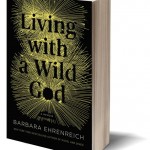Ripen as Beauty and Pleasure
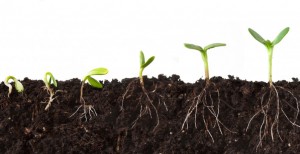 Last night I sat up reading Verses from the Center, Stephen Batchelor’s lovely translation of the ancient Sanskrit text by Nagarjuna who, according to Batchelor, “is arguably the most important figure in Buddhism after the Buddha himself.”
Last night I sat up reading Verses from the Center, Stephen Batchelor’s lovely translation of the ancient Sanskrit text by Nagarjuna who, according to Batchelor, “is arguably the most important figure in Buddhism after the Buddha himself.”
Here’s a sample:
Seeds turn into plants that bear fruit.
Motives turn into minds that bear fruit.
Seeds are neither severed from
Nor forever fused with fruits of plants,
Motives neither severed from
Nor forever fixed with fruits of minds.
No killing and no stealing,
No abusing and no lying,
No slandering, swearing, gossiping,
No coveting, resenting or fixating:
These pristine acts
Are ways to practice
That ripen as beauty and pleasure
Here and elsewhere.
Many Ways
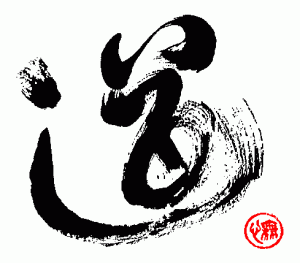 As I mentioned at the end of yesterday’s post, Ursala K. Le Guin has published a new version of the Tao Te Ching. She writes, “This is a rendition, not a translation. I do not know any Chinese. I could approach the text at all only because Paul Carus, in his 1898 translation of the Tao Te Ching, printed the Chinese text with each character followed by a transliteration and a translation.”
As I mentioned at the end of yesterday’s post, Ursala K. Le Guin has published a new version of the Tao Te Ching. She writes, “This is a rendition, not a translation. I do not know any Chinese. I could approach the text at all only because Paul Carus, in his 1898 translation of the Tao Te Ching, printed the Chinese text with each character followed by a transliteration and a translation.”
Le Guin goes on to say that she used Carus’s text as “a touchstone for comparing other English translations one with another. If I could focus on which word the translators were interpreting, I could begin to understand why they made the choice they did. I could compare various interpretations and see why they varied so tremendously; could see how much explanation, sometimes how much bias, was included in the translations; could discover for myself that several English meanings might lead me back to the same Chinese word.”
I love that she was not daunted by all those who had gone before her. She had fallen so in love with the text that she wanted to know it intimately, and she managed to do that, even though she couldn’t actually read the language it was originally written in. She lived with the text as best she could until she got to know it so deeply that she was able give it back to the world in her own voice. Wow.
Here’s a sample of her version (Chapter 1):
Taoing
The way you can go
isn’t the real way.
The name you can say
isn’t the real name.
Heaven and earth
begin in the unnamed:
name’s the mother
of the ten thousand things.
So the unwanting soul
sees what’s hidden,
and the ever-wanting soul
sees only what it wants.
Two things, one origin,
but different in name,
whose identity is mystery.
Mystery of all mysteries!
The door to the hidden.
***
Here’s the same text, from the 1972 translation by Jane English:
One
The Tao that can be told is not the eternal Tao.
The name that can be named is not the eternal name.
The nameless is the beginning of heaven and earth.
The named is the mother of ten thousand things.
Ever desireless, one can see the mystery.
Ever desiring, one can see the manifestations.
These two spring from the same source but differ in name: this appears as darkness.
Darkness within darkness.
The gate to all mystery.
***
I remember loving the ’72 translation, finding it beautiful, thinking it profound…but having no clue as to what it said. Reading Le Guin’s version, I still find it beautiful, and profound…but now I feel like I can actually begin to follow it!
Wow again.
More Exploring
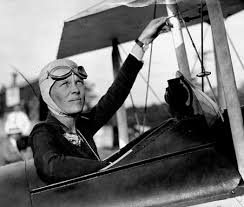 I went to the Chapel Hill Public Library today, which is FABULOUS.
I went to the Chapel Hill Public Library today, which is FABULOUS.
I went because I’ve finished all the books I downloaded onto my iPad before I left home and, feeling inspired by the Ursala K. Le Guin poem, which Greg Scharf quoted in his dharma talk (and which I have posted here), I thought I might find something more of hers to read.
I didn’t find any of her books in the poetry section. I found a lot of them listed in the science fiction section, a genre that I’m not really into, but I went ahead and looked through the shelves anyway, and I that’s where I saw… Always Coming Home …which is the last line of the poem Greg quoted!
I felt like I’d found bury treasure.
That poem grabbed hold of me from the very first line — so much so that I have started to memorize it — but when I looked on line, I couldn’t find anything about it. But then in the library, I saw the title of the book and I figured the poem must be in it (it is), even though the book is a novel…or sort of a novel, because it’s got drawings and maps and a glossary with an imaginary alphabet and all kinds of other outrageous things, including a cassette recording! (the book was published in 1985) of the music and poetry from the Kesh, the fictional people who are the subject of the book. (The library didn’t have the cassette, but it’s mentioned in the introduction, and an address in Oregon where it says you can order extra copies.)
I’m ashamed to say I’d never even heard of this book. But I have now!
And I’m totally engrossed in this literary adventure.
Here’s how it starts:
A First Note
The people in this book might be going to have lived a long, long time from now in Northern California.
The main part of the book is their voices speaking for themselves in stories and life-stories, plays, poems, and songs. If the reader will bear with some unfamiliar terms they will all be made clear at last. Coming at my work as a novelist, I thought it best to put many of the explanatory, descriptive pieces into a section called The Back of the Book, where those who want narrative can ignore them and those who enjoy explanations can find them. The glossary may also be useful or amusing.
The difficulty of translation from a language that doesn’t yet exist is considerable, but there’s no need to exaggerate it. The past, after all, can be quite as obscure as the future.
The ancient Chinese book called “Tao teh ching” has been translated into English dozens of times, and indeed the Chinese have to keep retranslating it into Chinese at every cycle of Cathay, but no translation can give the book that Lao Tze (who may not have existed) wrote. All we have is the “Tao teh ching” that is here, now.
And so with translations from a literature of the (or a) future. The fact that it hasn’t yet been written, the mere absence of a text to translate, doesn’t make all that much difference. What was and what may be lie, like children whose faces we cannot see, in the arms of silence.
All we ever have is here, now.
***
I find this “First Note” especially fascinating, since Le Guin herself has recently (2012) published her own translation of the Tao Te Ching. That’s next on my list!
Kitchen Retreat
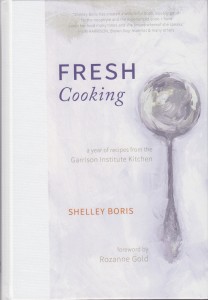 As you probably know, I love the food they serve at Spirit Rock. I like the food at IMS (Insight Meditation Society) too, but it’s not quite as spicy as it should be (in my opinion). But really, the very best food I’ve ever had on retreat was at the Garrison Institute (a gorgeous old former-Capuchin monastery, now a retreat center, on the banks of the Hudson River about an hour north of New York City.)
As you probably know, I love the food they serve at Spirit Rock. I like the food at IMS (Insight Meditation Society) too, but it’s not quite as spicy as it should be (in my opinion). But really, the very best food I’ve ever had on retreat was at the Garrison Institute (a gorgeous old former-Capuchin monastery, now a retreat center, on the banks of the Hudson River about an hour north of New York City.)
So I was delighted to discovered that their chef of 10 years, Shelley Boris, has just come out with a cookbook! It’s called Fresh Cooking: A Year of Recipes from the Garrison Institute Kitchen and it’s organized by month, with 3 (mostly vegetarian) menus each month, including desert.
Sample Menu for June
Fusilli with Peas, Squash Blossoms, Fresh Cheese, and Fennel
Carrot Slaw with Dill
Dandelion, Baby Leeks, and White Beans
Oregano Vinaigrette
Strawberries
Carrot Slaw with Dill (serves 6-8)
6 large carrots, peeled and grated
3 Tbsp. rice vinegar
2 Tbsp. minced, fresh dill
1 Tbsp. grape seed or olive oil (optional)
Salt & black pepper
In a large bowl, combine the carrots, vinegar, dill, oil (if using), and a pinch of salt and pepper. Mix and serve.
Tele-Book-Club-ing
 The Monday night Dharma Book Club met last night, and they put a laptop on one of the chairs in the circle so I could join them on Skype. It worked great!
The Monday night Dharma Book Club met last night, and they put a laptop on one of the chairs in the circle so I could join them on Skype. It worked great!
We’re discussing Mindfulness: A Practical Guide to Awakening by Joseph Goldstein and we spent quite a bit of time on this paragraph at the end of Chapter 5:
“As a meditation exercise, particularly in sitting, it is sometimes helpful to notice what aspect of impermanence is most predominant. Are we seeing new things arise even before the last one has ended? Are we seeing the endings more clearly and not seeing the moment of an object arising? Or do we see both the arising and passing away of objects equally? In the course of our practice, sometimes it is one way, sometimes another. Noticing how we perceive change is simply another way to refine our attention.”
So next time you’re sitting, check it out. What do you notice more — the sound of the air conditioner when it comes on, or when it stops? How about the gurgle in your stomach? The twinge in your knee? How about the urge to shift your weight? To look at the clock?
Asking yourself this question is helpful, not because there’s anything special about the beginning or ending of any of these things, but because this kind of investigation brings more awareness to what’s actually happening in the moment — as to opposed to what you assume is happening. It’s this more aware attention that we’re trying to develop. Because this is what will allow us to see things more clearly…with less of an “I know this already” attitude…which will allow us to respond to whatever is happening based on what’s actually happening instead of what we think is happening. Or not really knowing what’s happening at all, and just cruising along on autopilot!
Check it out.
What a Life
 I was thinking about the life I have found myself in — this quite pleasant life that seems to revolve more and more around studying and practicing and sharing the Dharma — but I couldn’t quite think of what, exactly, I wanted to say about it, so I decided to go for a little random inspiration by opening one of my (many) dharma books…in this case Teaching of the Buddha, edited by Jack Kornfield…and here’s what popped out:
I was thinking about the life I have found myself in — this quite pleasant life that seems to revolve more and more around studying and practicing and sharing the Dharma — but I couldn’t quite think of what, exactly, I wanted to say about it, so I decided to go for a little random inspiration by opening one of my (many) dharma books…in this case Teaching of the Buddha, edited by Jack Kornfield…and here’s what popped out:
“….Whatever people do, whether they remain in the world as artists, merchants, or officers of the king, or retire from the world and devote themselves to a life of religions mediation, let them put their whole heart into their task; let them be diligent and energetic.
“And if, like the lotus flower, which grows out of muddy water but remains untouched by the mud, they engage in life without cherishing envy or hatred, and if they live in the world not a life of self but a life of truth, then surely joy, peace and bliss will dwell in their minds.”
–from the Buddhacarita, translated by Samuel Beal
Wild.
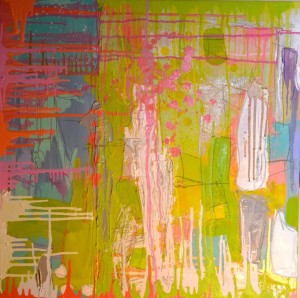 OK. So, I’m not quite sure what to say about this, but I recently finished reading Living with a Wild God: A Nonbeliever’s Search for the Truth About Everything, by Barbara Ehrenreich. I was mesmerized. The book gets a little crazy toward the end, but ….wow…. something happened to her…I don’t know what it was, but it sounds a whole lot like the Enlightenment experiences I’ve read about:
OK. So, I’m not quite sure what to say about this, but I recently finished reading Living with a Wild God: A Nonbeliever’s Search for the Truth About Everything, by Barbara Ehrenreich. I was mesmerized. The book gets a little crazy toward the end, but ….wow…. something happened to her…I don’t know what it was, but it sounds a whole lot like the Enlightenment experiences I’ve read about:
“Something peeled off the visible world, taking with it all meaning, inference, association, labels, and words. I was looking at a tree, and if anyone had asked, that’s what I would have said I was doing, but the word ‘tree’ was gone, along with all the notions of tree-ness that had accumulated in the last dozen or so years since I had acquired language. Was it a place that was suddenly revealed to me? Or was it a substance–the indivisible, elemental material out of which the entire known and agreed-upon world arises as a fantastic elaboration?
“I don’t know, because this substance, this residue, was stolidly, imperturbably mute. The interesting thing, some might say alarming, was that when you take away all human attributions–the words, the names of species, the wisps of remembered tree-related poetry, the fables of photosynthesis and capillary action–that when you take it all away, there is still something left.”
***
I don’t know what else to say.
Except: Read the book. It’s fascinating.
And beautifully written, besides.
(image by Lucy Williams)
Unwise Attention
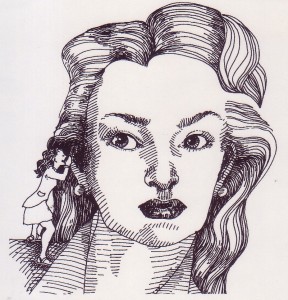 In some ways, we didn’t “get very far” in our discussion last night of Joseph Goldstein’s new book, Mindfulness: A Practical Guide to Awakening, because we started…and ended…on page 17, where the Buddha is quoted as saying, “whatever we frequently think of and ponder, that will become the inclination of our minds.”
In some ways, we didn’t “get very far” in our discussion last night of Joseph Goldstein’s new book, Mindfulness: A Practical Guide to Awakening, because we started…and ended…on page 17, where the Buddha is quoted as saying, “whatever we frequently think of and ponder, that will become the inclination of our minds.”
But though we didn’t get “far” in terms of pages, I think we went a long way in terms of practice, because we spent most of the time talking about what all this means about what we should do….in our daily life, with relationships, work situations, conflicts and struggles. Especially when there are people and things that really piss us off!
The discussion brought to mind something I had just read in Bhikkhu Analayo’s excellent (but formidably titled): Excursions into the Thought-World of the Pali Discourses.
Here’s what Analayo says, quoting directly from the Buddha’s teachings:
A prominent cause of the arising of ill-will is unwise attention to the sign of irritation (AN I 3). [By “sign of irritation” he means whatever it is that we get pissed off about.] Once ill-will has arisen, the mind tends to return again and again to the particular sign, event or person that has occasioned the arising of ill-will.
As to what to do about it:
Intentional relaxation can have substantial results if applied directly to the mind itself. The point here is that ill-will inevitably involves a narrow perspective, usually a focusing on the irritating and displeasing aspect of a situation or a person at the exclusion of other aspects that do not reinforce irritation….A conscious broadening of the scope of perception can go a long way in undermining the foundations of ill-will.
So in plain English:
Don’t spend so much energy thinking about whatever it is that’s pissing us off. Recognize it, yes, but then expand the focus of attention to include things about the person or situation that do NOT piss us off!
***
(illustration by George Willett, from Roger von Oech’s Creative Whack Pack)
A Peek at a Retreat
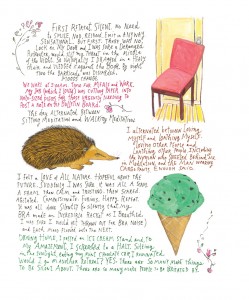 Last year, artist Maira Kalman sat her first ever silent retreat at IMS (Insight Meditation Society, in Barre, MA) and produced a series of illustrations about her experience, which appeared over several months in Mindful Magazine.
Last year, artist Maira Kalman sat her first ever silent retreat at IMS (Insight Meditation Society, in Barre, MA) and produced a series of illustrations about her experience, which appeared over several months in Mindful Magazine.
Here’s the first installment. (Click on the image to enlarge.)
Wake Up!
 I was in kind of a fog today and just couldn’t think of what I wanted to post. So I stood in front of my bookshelf for a while until I found myself picking up one of the books, then I just sort of let it fall open….to see if something might present itself.
I was in kind of a fog today and just couldn’t think of what I wanted to post. So I stood in front of my bookshelf for a while until I found myself picking up one of the books, then I just sort of let it fall open….to see if something might present itself.
The book turned out to be Comfortable with Uncertainty: 108 Teachings, by Pema Chodron
Here’s the page it opened up to:
#20: “All activities should be done with one intention.”
Breathing in, breathing out, feeling resentful, feeling happy, being able to drop it, not being able to drop it, eating our food, brushing our teeth, walking, sitting–whatever we’re doing could be done with one intention. That intention is that we want to wake up, we want to ripen our compassion, we want to ripen our ability to let go, we want to realize our connection with all beings. Everything in our lives has the potential to wake us up or to put us to sleep. Allowing it to awaken us is up to us.
***
I post this today with the intention to wake up!
May it be so.

